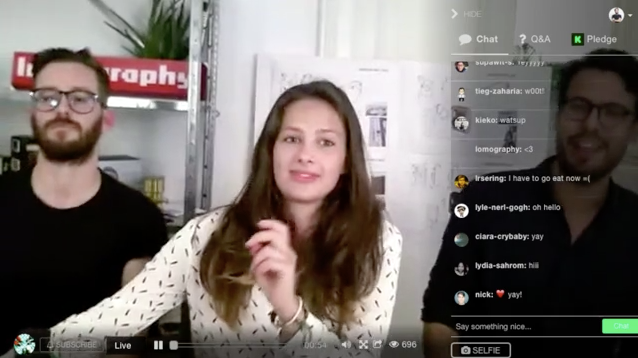
Featured Blog | This community-written post highlights the best of what the game industry has to offer. Read more like it on the Game Developer Blogs.
Top Kickstarter Tips From Kickstarter's Video Games Expert
I talk to a ton of people who are planning to launch game projects on Kickstarter. Here's what I tell them.


I’m one-half of the games team at Kickstarter — the half that focuses on videogames in particular. So I spend a lot of time giving advice to game creators about their projects and answering questions. I thought I’d boil down my most-repeated advice into a quick list for the benefit of Gamasutra readers. If you’ve ever thought of running a Kickstarter project, read on!
But first, a bit more about me: I’ve been in games for almost 10 years, starting at the Flash site AddictingGames, now part of Nickelodeon. My main job there was developer relations, so I licensed hundreds of games and worked with awesome indie developers — some of whom are now doing Kickstarter projects. Before coming to Kickstarter I also worked in mobile game development at Nickelodeon.
OK then, here are my five tips for Kickstarter creators on things you should definitely do:
1. Start telling people about your project well before you launch it.
We recommend starting your outreach at least six months in advance. Why? Because nowadays, running a Kickstarter project is really an exercise in building a community. You want to ask yourself, how many people do I have in my network? That includes your friends and family, your social media following, and the rest of your fans. How do I connect with those people? Is it through Twitter, Facebook, or some other social network? Through a mailing list? (Side note: We’ve seen that mailing lists can be super-powerful, so if you don’t have one and are thinking of running a project, start one!)
Bringing new people into your community is important too. You can do this IRL by going to events in your area. Are there game-specific meetups nearby, or game trivia nights at bars? Can you hold a playtesting night at a local university? Do you have a local IGDA chapter? Online communities you participate in, like Facebook groups and forums, are also good places to get the word out, but be sure to practice good etiquette and avoid spamminess.
2. Ask for feedback on your project before you launch.
Kickstarter gives you a preview link so you can share a private draft of your project with people you trust. They can post feedback right on the page. Pay close attention to what they have to say. Believe it or not, people want to see you succeed!
3. Plan for your campaign’s funding period, from beginning to end.
We recommend posting a new project update roughly every two days during the campaign, so before you launch, have your first set of updates ready to go, or at least planned out. If you’re thinking of doing any streaming (you should!), have a stream or two planned out in advance. Twitch is obviously the best-known place for game streaming, so making use of that platform is fantastic. But there are other ways to reach folks through streaming, like Facebook Live and also Kickstarter Live (below), a new streaming option we rolled out last year that integrates with your project page.

4. BUT be ready to roll with changes.
Things come up! If your plans for the game change mid-campaign, make the necessary updates and let your community know. Be prepared to respond to any questions about the game, including those about development time and your budget. Keep an open mind and factor community input into your decision-making when it seems useful.
5. Be responsive to your community.
Speaking of questions, having someone dedicated to addressing feedback from your backers and others is extremely helpful, because it lets you focus on making your game. If you can, designate someone on your team or hire a community manager. But you should also take some time to chat with your backers yourself, on Kickstarter Live or elsewhere.
♦
And here are three things you should definitely not do:
1. Don’t ‘ghost’ your backers.
Stay in touch with your community, and be honest. The worst thing you can do is to stop communicating because you don’t know how to answer a question or have bad news. Being open is so much better than saying nothing, even if you have news that isn’t great.
2. Don’t hire outside help without vetting them first.
There are countless marketing and PR services dedicated to crowdfunding, and many of them will promise you the world. We definitely suggest doing some research. You might ask for references — can they connect you with creators who would recommend their services? Creators we’ve talked to have had good experiences with the consultants listed on our Kickstarter Experts page.
3. Avoid launching a project around any major U.S. holidays.
Don't launch your project or have it end on Christmas, New Years, or July 4th. Unless of course you have a legion of screaming fans who will leap to their screens to support you.
♦

One of the best things about my job is getting involved with a game at the Kickstarter stage and then seeing the results of the creator’s hard work — excellent and unusual games like Pinstripe (above), Thimbleweed Park and Rain World. If you think you’ve got a great game inside of you, I’d love to hear about it. Please don’t hesitate to reach out! And there’s lots more info about running a project in our Creator Handbook and on Campus, our message board for creators.
Read more about:
Featured BlogsAbout the Author(s)
You May Also Like












